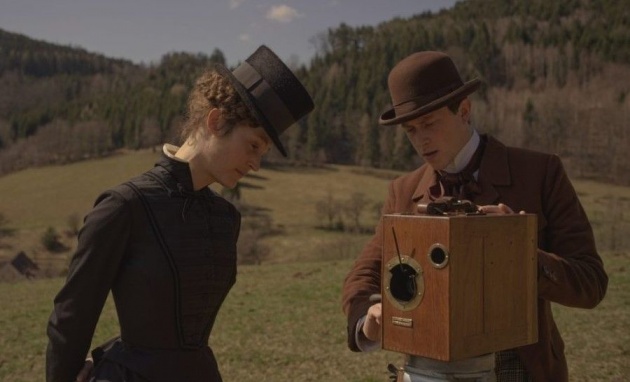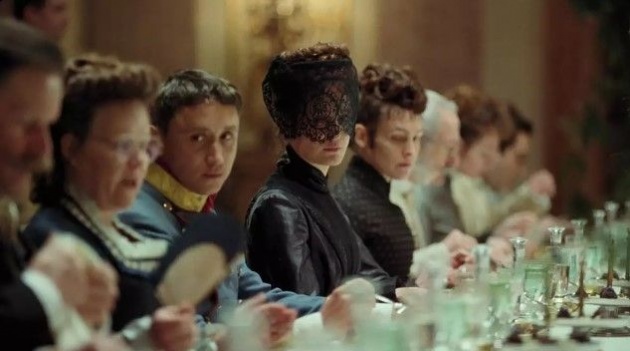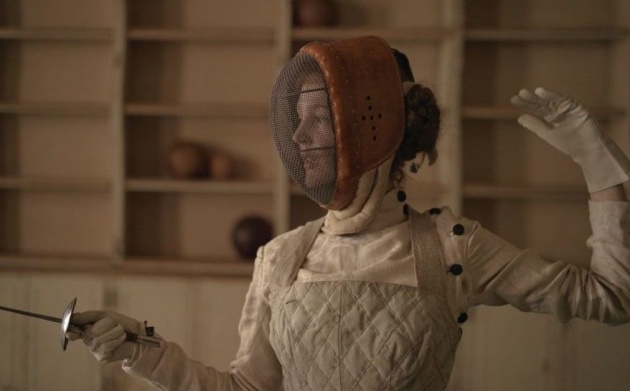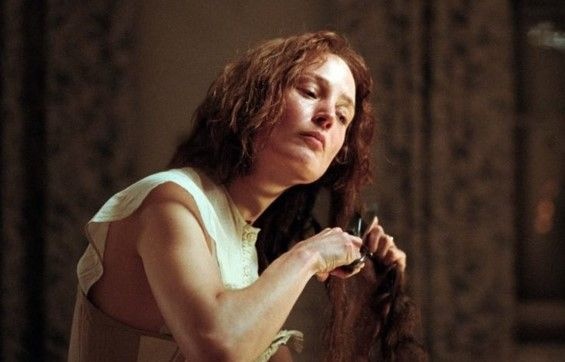
Pictured: Empress Sisi of Austria (Vicky Krieps) gets a lesson in early filmmaking from Louis Le Prince (Finnegan Oldfield) in the revisionist period drama, 'Corsage', written and directed by Marie Kreutzer. Still courtesy of IFC Films (US) / Picture House (UK) / AG Films
Why do film directors, when dealing with historical subjects, stray from the truth? Usually, it is for commercial reasons. You take a real figure and imagine a romance that they never had in order to give a hook to your narrative. Emily, Frances O’Connor’s biopic of Emily Brontë, is an example of this. Corsage, Austrian writer-director Marie Kreutzer’s fifth feature, does this to an extreme. The inference, at the end of the film, set between December 1877 and the autumn of 1878, is that its subject, Empress Elizabeth of the Austro-Hungarian Empire, committed suicide by throwing herself from the prow of a ship, aged 40. In reality, Elizabeth lived until 1898, when she was assassinated by an Italian anarchist. Kreutzer’s film doesn’t just feature one historical indiscretion. It imagines Elizabeth (Vicky Krieps), known affectionately as Sisi, meeting the father of cinema, Louis Le Prince (Finnegan Oldfield), in Northumberland in the spring of 1878. She then becomes the subject of a test film in which she carries a chalk board up to the camera, then grabs the folds of her dresses and leaps up and down in an angry manner, having been told that she can say what she likes as long as she smiles. ‘Can you bring the camera towards me?’ she asks. ‘There’s an idea,’ replies Louis before telling her, no. Later, Sisi explains that cinema will replace painting as a principal mode of representation. This even before Louis Le Prince had publicly demonstrated early cinematography.
Another exchange gets to the heart of the matter. Sisi poses for a portrait before stepping away to examine the artist’s outline. She instructs him to find some of the other paintings of her hung around the palace and copy them. Later, her husband, Franz Joseph (Florian Teichtmeister) will remark that she looks even younger in her latest portrait, then adding pointedly, ‘it will be a good reminder when you’re gone.’ The inference is that royalty wilfully engaged in its own mythmaking through portraiture; Kreutzer does the same thing in the spirit of artists working on commission.
The Sisi of Kreutzer’s film is wilful and restless, though not for the want of trying to find a role for herself. At dinner, she asks about Sarajevo. Franz Joseph tells her that it is his job to govern and hers to represent, though in the film, he’s not above his own mythmaking, wearing a set of stick-on sideburns, peeled off for comic effect. She denies the request from her sister, Marie (Katharina Lorenz) to marry. Rather, she asks her to be her stand-in as she receives heroin to treat her malaise. ‘It’s harmless,’ a doctor tells her sincerely, though the audience knows better.
There are three recurring representations of Sisi throughout the film. First, Sisi, fully clothed (minus shoes) under water. In the first scene, two maids watch as Sisi holds her breath underwater. ‘How long?’ she asks after surfacing. ‘Vierzig’ (forty seconds), says one maid. ‘A minute and three,’ says the other, wanting (perhaps) to flatter her employer. Do we see Sisi’s underwater plunges as a means of fortification, to make herself better able to survive the plunge at the end of the film? The tin bath into which she just about fits is a confining space. Undoubtedly, the movie Sisi feels trapped.
This links to the second recurrent image: Sisi having her undergarment, the corsage (upper part of the dress) tightened. Sisi berates a maid for not having the strength to fasten it; later we see that Sisi gets as good as she gives. Sisi is desperate to keep her weight down, subsisting on a minimal diet of orange slices and tea without milk. Constricted by an undergarment, a physical form of entrapment, Sisi is susceptible to falling, the third recurrent image, whether it is fainting in public having listened without reply to some disparaging remarks about her presence – and previous absence – or falling from a horse, jumping from a window, or finally leaping from the aforementioned ship’s prow. Sisi, it is implied, longs for death. We see her celebrate her 40th birthday, to a chorus of ‘long may she live’, extinguishing with steady puffs the candles of cake placed on a spinning turntable – a cake she will not taste. Even at her birthday banquet, she is the subject of disparaging remarks. She is not expected to respond.

Pictured: 'Long may she live.' Empress Sisi (Vicky Krieps) sits between her son, Rudolf (Aaron Friesz) and sister Marie (Katharina Lorenz) in a scene from the historical drama, 'Corsage', written and directed by Marie Kreutzer. Still courtesy of IFC Films (US) / Picture House (UK) / AG Films
Sisi is alienated from her children. Her youngest daughter, Valerie (Rosa Hajjaj) chides her for her behaviour, notably when in a hospital ward, she lies next to a soldier in his bed and smokes alongside him. Valerie complains about the smoking. Nevertheless, she wants to give her mother the benefit of the doubt. ‘Come and see the Christmas trees being delivered,’ she implores, ‘they’re the biggest ever.’ ‘I’m not interested in dead plants,’ replies Sisi, dismissively. Early on, Sisi, in a typically impulsive fashion, awakens Valerie and takes her horse riding at night. ‘I can’t see,’ complains Valerie. ‘The night protects us,’ insists Sisi. By night’s end, Sisi carries her coughing child indoors. Franz Joseph is furious. ‘You of all people’, he exclaims. ‘Remember Sophie.’ Sisi replies that her firstborn daughter would have died (aged two) anyway, even if they hadn’t travelled. Later, Valerie presents her with a picture, adding, ‘you were very dignified that day.’ Only Valerie has in fact drawn her aunt in a purple dress with a veil over her face, Marie standing in for Sisi.
Her son, Rudolf (Aaron Friesz) is also scandalised by his mother, and with cause. ‘You spend too much time with your riding instructor,’ he tells her, referring to Bay Middleton (Colin Morgan), whom she visits in Northumberland. ‘He is not my riding instructor. I ride as well as him,’ Sisi replies. Bay is in a relationship but will not marry. ‘You know why,’ he tells Sisi. For Sisi’s part, she enjoys being looked at and told she is beautiful – compliments are invited. Their relationship, though intimate, isn’t physical. When Sisi decides to leave Northumberland early, she attributes this to her son’s concern. ‘I won’t see my sister again,’ she also exclaims, though this isn’t true.

Pictured: Empress Sisi (Vicky Krieps) practices parry and thrust in a scene from the historical drama, 'Corsage', written and directed by Marie Kreutzer. Still courtesy of IFC Films (US) / Picture House (UK) / AG Films
Sisi’s riding prowess isn’t absolute. After her fall, her horse is put down. ‘I wish I had been shot instead,’ she exclaims, furious after the accident. In an early scene we see her riding in an enclosure whilst a servant plays the piano; another image of Sisi’s entrapment. Later, Sisi encourages a servant to ride a horse, Sister sitting behind her. She wants other women to feel the sense of power afforded by riding, though whilst out she sees Franz Joseph with a young woman. Sisi later invites the woman, twice married, though barely eighteen to tea and asks her to be her husband’s mistress. ‘You like him after all,’ she tells the young woman. They first meet when Sisi asks to borrow a servant’s dress to walk the streets incognito, tasting some meat that the young woman intends to buy. ‘I am happy to be guided by an older woman,’ the young woman remarks, praise that Sisi experiences as an insult.
Sisi’s relationship with Franz Joseph is fractious. In an early scene, in which she demonstrates to her cousin, Ludwig (Manuel Rubey) the art of fainting – they both end up on the floor – Franz Joseph is kept waiting in an otherwise unremarkable corridor in which gold-coloured chairs are stacked to one side. Sisi flirts with her cousin and later visits him. Ludwig is somewhat encouraging. ‘I wish I could be your dog. Then I wouldn’t worry your husband so much,’ he tells her. ‘My husband is jealous of my dog,’ Sisi replies. Ludwig is not physically intimate with Sisi. ‘So the rumours of the stable boys are true,’ Sisi remarks whilst lying next to him. Ludwig doesn’t confirm this. For his part, in a memorable scene, he encourages her to drink chocolate straight from the jug. It spills onto her chin and dress; the waste is shocking. After Sisi starts being injected with cocaine, she eats more. Having a doppelganger relieves of the burden of staying in shape.
The danger of films like Corsage is that they are taken as historical fact. Kreutzer does tip us off that her film shouldn’t be taken as such through her anachronistic use of music. First, a man with a lute performs a version of Kris Kristofferson’s ‘Help Me Make It Through the Night’, as Sisi dances with Bay. In a later scene, a woman with a harp performs the song ‘As Tears Go By’, written by Mick Jagger, Keith Richards and Andrew Loog and made famous in the 1960s by Jagger’s then lover, Marianne Faithfull. Kreutzer is not the first director to insert 20th Century music into a period setting – Brian Helgeland memorably did so in A Knight’s Tale. By doing so, Kreutzer adopts an impressionistic approach to history, suggesting the pressures of life in royal service. She is playing with an icon as well-known to Austrians as Queen Victoria is to the British; Sisi is also the subject of a Netflix series, The Empress. Sisi’s experiences resonate with those of Diana Spencer, Meghan Markle and Sarah Ferguson – the pressure both to be seen and to be silent.
Kreutzer also portrays Sisi’s restlessness as traumatic. In another early scene, Sisi visits a mental asylum in which men are treated separately from women. One man is rendered silent owing to a syphilitic condition. Sisi gives him a bag of candied violets, telling him, ‘You will like them’. The certainty is grating. ‘Do you remember when you saw me last, you told me I was beautiful,’ she asks, we the audience starting to fear for her. The catatonic man says nothing. In the women’s ward, we see a woman in a white nightdress spreadeagled over a bed, bound at her wrists and ankles, receiving electroshock therapy. Kreutzer cuts to Sisi in bed. The association is not subtle. Sisi too is ‘bound’ and treated with little understanding of her condition.
Sisi is not unfaithful to her husband but doesn’t allow him to penetrate her either. ‘I’m too old for another child,’ she tells him. At one point, Sisi finds she is dining alone. She storms out of the room to find him. She is told Franz Joseph has eaten earlier and gone to bed. ‘Is he ill?’ she asks. ‘No,’ she is told by a smiling young man, enjoying the slight that Sisi experiences. Franz Joseph is portrayed sympathetically, doubting the wisdom of forming an empire with Hungary – Sisi is required to spend time there to consolidate the two kingdoms. ‘What has Hungary brought us?’ he asks during one meal. ‘People,’ Sisi replies. She thrives on the adoration, even though it is more imagined than experienced.
We hear music associated with Joseph Haydn’s ‘Deutschland über alles’ sung twice with different lyrics in honour of Sisi’s appearance on behalf of the empire, a reminder that empires are not benevolent. The current Austrian national anthem, ‘land of mountains’, was commissioned in 1946. Sisi tells her son that he will not make a good emperor, little knowing that he will end up being killed in a hunting lodge in Mayerling in 1889, an incident still regarded as a mystery. Kreutzer doesn’t examine empire, only the lifestyle enjoyed at its head. Her film does not entertain nostalgia.
Towards the end of the film, though having already granted him a mistress, Sisi does allow Franz Joseph to make love to her. The death leap can be interpreted as her way of dealing with the consequences of that act. Kreutzer invites us to consider Sisi as a tragic figure, full of contradictions. Krieps’ performance is magnificent. On screen throughout, she expresses Sisi’s strengths and frailties, her vanity, and her desire to break free from convention. Ultimately, no one wants to upset the powerful Austro-Hungarian Empire enough to fall for her.

Pictured: In a further act of rebellion, Empress Sisi of Austria (Vicky Krieps) cuts her own hair in a scene from the Austrian historical drama, 'Corsage', written and directed by Marie Kreutzer. Still courtesy of IFC Films (US) / Picture House (UK) / AG Films
Corsage is decidedly unromantic. Making a film about a victim is not without danger, but Kreutzer has an interest in the spectre of mental illness, the topic of her previous film, The Ground Beneath My Feet (2019). At one point, Sisi cuts her own hair, rendering one maid disconsolate. ‘It’s my life’s work,’ the maid cries – and we feel for her. Sisi is also portrayed as interested in modern techniques, which draws Louis Le Prince to her. She is, in spite of her leap, an optimistic figure, if perhaps an impatient one. Over the end credits, we see her dancing in what looks like an asylum building, wearing a stick-on moustache. This can either be viewed as evidence that she survived the jump or an imagined expression of freedom. Kreutzer’s film is a riposte to heritage cinema – sometimes literally, with Sisi taking fencing lessons and insisting that she is better than her husband. Kreutzer certainty invites us not to idolise nor objectify royalty.
Reviewed at Curzon Canterbury (Screen One), Southeast England, Friday 30 December 2022, 15:10 screening



